HELP! My Baby Has NO Interest in Food at First
- Why you DON’T need to worry if your baby isn’t eating much early on in BLW...it’s not your job! You DO have other jobs & I break those down but worrying about HOW MUCH or even WHETHER your baby is eating, that is not your job!
- When most babies DO start to experience an uptick in solid food intake and become less reliant on milk for nutrition...and also what you can do if your baby DOESN’T experience this, it may be a quick fix.
- Why stressing about baby not eating early on in BLW is a pretty big waste of your time and in the larger scheme of things is NOT problematic. Practice makes perfect though, so we’re talking about how to optimize your baby’s success for self-feeding down the road once they DO start taking to self-feeding.
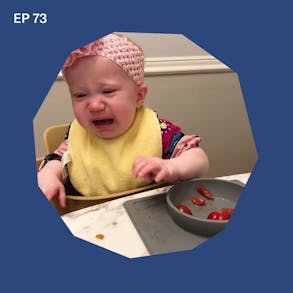
LISTEN TO THIS EPISODE
Episode Description
The first few days, weeks & even months of baby-led weaning can feel BRUTAL. Like your baby isn’t eating a lot and you’re worried they’re not “getting enough” or missing out on iron or what if their growth starts to falter??...
Fear not! MOST babies don’t take IMMEDIATELY to food and that’s because they need time to learn HOW to eat. In this episode we’re breaking down WHY your baby is probably not super interested in food at first and WHAT to do (and NOT do when this happens!)
Links from this Episode
- Baby-Led Weaning with Katie Ferraro program with the 100 First Foods™ Daily Meal Plan, join here: https://babyledweaning.co/program
- Baby-Led Weaning for Beginners free online workshop with 100 First Foods™ list to all attendees, register here: https://babyledweaning.co/baby-led-weaning-for-beginners

Latest Episodes
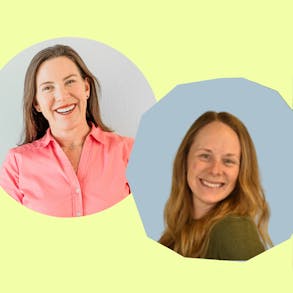
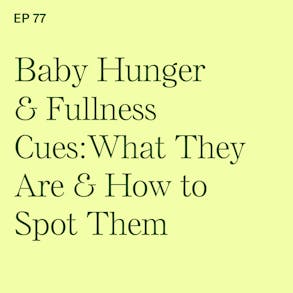
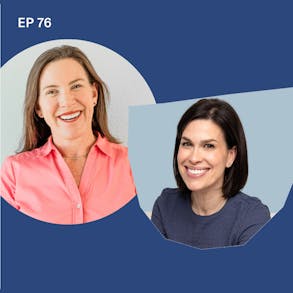
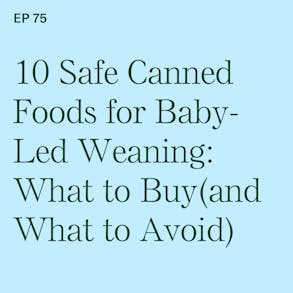
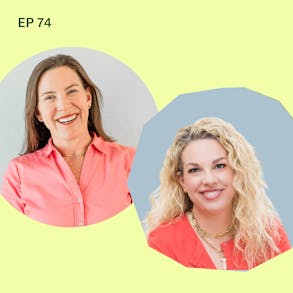
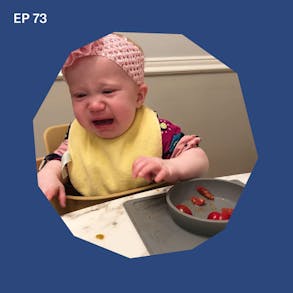
Katie Ferraro (1s):
And so mom is stressing because the baby's not eating anything. And what if they're not getting enough iron and calories and there's growth. Faltering mom, baby needs the opportunity to learn how to eat. You don't need to stress about how much your baby's eating early on. Hey there, I'm Katie Ferraro, Registered Dietitian, college nutrition professor, and mama of seven specializing in baby-led weaning. Here on the Baby-Led Weaning Made Easy podcast I help you strip out all of the noise and nonsense about feeding, leaving you with the competence and knowledge you need to give your baby a safe start to solid foods using baby-led weaning.
Katie Ferraro (41s):
Hey guys, welcome back to another episode of the Baby-Led Weaning Made Easy podcast, and this is for the parents and caregivers just starting out stressing that their baby is not interested in food. At first. I know it can be hard when you get all like super psyched and geared up to two baby-led weaning, and then your baby just sits there and looks at you. And you're like, what am I doing? And then a few days and weeks, sometimes even one to two months will go by where this is happening. And you were like, what am I doing wrong? I am here to remind you that you are not doing anything wrong. A lot of babies are not interested in food early on in self-feeding. And that is totally typical. So let's talk about why we're going to unpack today. Why babies do this and then what you should be doing to kind of stay in your lane with regard to your jobs in the division of responsibility, in feeding theory, and then when's it all going to change.
Katie Ferraro (1m 31s):
And when do you flip the script where the baby is actually interested in all this amazing, wholesome food that you're providing? So let's dive in, we're talking to the parents who are screaming, help buy. Baby has no interest in food. As I like to do with every episode, I want to start out with a baby-led weaning tip of the day today's tip of the day is let's remember what our job is. If you look at Ellyn, Satter's division of responsibility. In feeding theory, we have jobs and our babies have jobs. Our job, as the parent, we are allowed to worry about what our baby eats when they eat and where they eat. All right? But it's ultimately up to the baby to determine how much or even whether they eat. So we're going to talk a little bit more about this in today's episode, but it's not your job to worry about how much your baby is eating or even whether your baby is eating.
Katie Ferraro (2m 19s):
So hang tight because we are going to talk in this episode about what your job as the parent is and how you can help facilitate success in self-feeding for baby-led weaning. But I want you to stop stressing. And for those of you just starting out with baby-led weaning, if you're concerned that your baby is not interested in the food you're putting out there, I want to tell you a quick story, three different variations of babies, not caring about the food that I was making as a mom. So my oldest daughter, Molly, I did traditional spoonfeeding with her and we struggled to the high heavens. I mean, I started spoonfeeding at four months of age. I'm a dietitian. Like I just listened to what my doctor said. She didn't seem interested in food. And I was like, this doesn't really feel right, but I guess I need to be it.
Katie Ferraro (2m 60s):
And I felt like I was forced feeding her. So not only was she not interested in food, but I felt like I was making her do something she did. I didn't want to do that was my first one. Then I had quadruplets the baby-led weaning with them. Cause I was like, ah, no way. I am not going to spoonfeed four different babies. And one of those babies, Henry, I always tell him story, but he kept his head down on the table for the first six weeks when the three other quads were eating food and kind of getting into it and getting better at it. And I was worried that he was going to be left in the dust. And then after that we had twins. I did baby-led weaning with them. At this point I was working exclusively in baby-led weaning. It was certainly my specialty. And I still had a situation where at first my daughter, Hannah boy-girl twins, cousin, Hannah, Hannah, was super into eating and Gus wasn't really feeling it.
Katie Ferraro (3m 45s):
And then about two months into it, it totally switched. And she got super disinterested in food and he became like the eating monster. And I was like, oh my gosh, what's wrong with her? So there's no shortage of ways that you can stress yourself out about how much or even whether your baby is eating. And if there's anything you can take away from those three different scenarios, it is that it has nothing to do with what I was doing. Every baby is different. Every baby will get ready to eat on their own at their own time. But here's the takeaway message from today's episode. Practice makes perfect. If our goal is to have babies, eating modified versions of the same foods, the rest of the family is eating by the time the baby turns one, they don't just wake up on their first birthday and magically know how to do this.
Katie Ferraro (4m 27s):
The point of the weaning period between six and 12 months of age is to allow baby the opportunity to learn how to eat. So if at any point during the first few days and weeks, and even the first one to two months, if you're feeling stressed about how much or the fact that your baby's not eating, remind yourself, this is the practice period. Like when you're on a team and you're playing sports. The reason why you practice is so that when it actually matters, you're good, right? When it only matters a few months down the road and your baby should be getting more of their nutrition from food milk. That's when it matters early on. And baby-led weaning. I don't love the saying food before. One is just for fun, but there is a little bit of truth to it in that every single it doesn't have to matter. And we don't have to micromanage the calories and the ounces and the milligrams and micrograms food that our baby's eating because early on in weaning, most of your baby's nutrition is continuing to come from breast milk or formula at the six and seven and sometimes even the eight month mark.
Katie Ferraro (5m 21s):
So again, please don't stress about how much your baby is eating. Think of this every time he put that baby in the high chair, as an opportunity for your baby to practice learning how to eat. So what your baby needs from you is not to stress about how much or even whether he or she is eating, but your baby needs you to be offering them a variety of foods. So different textures, different flavors, the allergenic foods, little by little, they'll actually start to eat some of that. But you do your job about what to feed you. Make sure you're feeding your baby in a safe space. That's properly seated in a high chair with their feet, resting flat on a foot rest that helps facilitate a safe swallow. And then our third job is when to feed. We feed at prescribed or set meal times we don't feed the baby Willy nilly all throughout the day and let them graze.
Katie Ferraro (6m 2s):
Those are not good habits to get into when your baby is six to seven months of age, try to get them in that high chair. One to two times a day at eight to nine months of age, bump that up to two to three times a day. And then by the time your baby is 10 months old, love to see you feeding your baby three times a day, emulating about three meals a day. Babies do not need snacks. So don't feel stressed that you need to add two or three snacks on top of three meals. That's way, way, way too much food prep on your part, but stick to your job, what your baby eats, where they eat and when they eat and allow your baby to do their job, which is determining how much or even if they want to eat. Now, when you're practicing in the high chair and practicing with the food out there, and they're not eating very much that remind yourself, most of my baby's nutrition is coming from breast milk or formula and try to keep the baby in the chair for about 15 minutes.
Katie Ferraro (6m 47s):
Some parents, especially early on at the baby is stressing or fussing. They'll immediately pull the baby out of the high chair. And what happens there is your baby becomes conditioned to realize, Hey, if I cry, she'll take me out of the high chair. So unless your baby is in overt distress, it's okay. If they're a little bit fussy in the hiker, as they're learning to get accustomed to this new part of the routine. So when do things change, when will my baby start actually being interested in food for most babies, it all clicks around the eight month mark. And I say eight months. And that you started offering solid foods one to two times a day at about the six month mark or when your baby was close to six months and showing the other signs of readiness to feed. If you've never done anything except breast milk or formula. And once you introduce that, they're not going to be ready to feed themselves independently eight months.
Katie Ferraro (7m 29s):
But if we started around six months of age, most babies after four, six, sometimes eight weeks of practicing at one to two, and then two to three times a day, they will then get the hang of it. And it really all clicks. And you talk to any parent who's in that kind of magical eight to nine month mark, a baby-led weaning. And they're like, oh my gosh, Katie, you're totally right. It all clicks. My baby started eating more food, becoming less reliant on milk. I dropped a milk feed. Food intake started picking up. They're more engaged in food. Now they're responding to their hunger and their fullness cues. That's when it all kind of becomes well, this is working, but don't stress out if it doesn't happen overnight. Now, what happens if things don't change, if you're well into the eight, nine month mark, sometimes I work with families, my babies, 10 months of age, we've been doing this for four months and they're not interested in touching the food or bringing any of it to their mouth.
Katie Ferraro (8m 17s):
If you've been doing this for four months, one day, two times, and then two to three times a day, and your baby's not engaging at all with food, just know that by the 10 month mark that's certainly right, is not typical. And if that's the case, that's something you should likely to speak to your pediatrician about and then seek the help of a qualified feeding therapist. A feeding therapist is either a speech language pathologist or an occupational therapist who has additional training and specializes in infant feeding. They can help you sometimes in as little as a few short therapy sessions recognize what the potential problem is. It's what you think is a problem is actually even a problem. And then if it is strategize together on some approaches to help overcome those problems. So if you guys are interested in getting more info on a safe start to solid foods, if you're just starting out and a lot of this is stressing you out in any way where you're concerned that your baby's not going to get to the point where they get enough other nutrition, come check out my free online workshop.
Katie Ferraro (9m 9s):
It's called baby-led weaning for beginners. I teach it every week all about how to get your baby to eat 100 Foods without you having to spoonfeed purees or buy pouches. And don't do that. Cause some parents get stressed. Their baby's not bringing the food to their mouth. Then they start force-feeding the baby with the spoon. And that's certainly not what we want to do. It's not important. It's not a developmental milestone for your baby to learn how to suck food off of a spoon that you shove in their mouth. Take a step back, relax and recognize that this is all a period of practice. If you do want to take the free online workshop, you can sign up. There's a link at the show notes for this episode. If you go to BLWpodcast.com/73, everyone in the workshop gets a copy of my 100 First Foods list. And once your baby gets jamming with foods, you're doing one new food a day.
Katie Ferraro (9m 52s):
You will be amazed at how quickly once they get over that little hump at the beginning, where you're frustrated right now that they'll really take to feeding themselves that the really be interested in taking advantage of that flavor window, where babies will like and accept a wide variety of foods, but you've got to stick with it. Don't give up. Your baby will get past this phase and you will too. And remember by introducing such a wide variety of foods, 100 different foods early and often, the research shows us that those are the babies who are more likely to be independent eaters and less likely to be picky eaters. That's why we're doing this. We're helping to raise an independent eater, sign up for the workshop@blwpodcast.com/73.
Katie Ferraro (10m 32s):
And thanks so much for listening. Don't get frustrated if your baby's not interested at first, I promise you it will happen and practice makes perfect. Bye now.

The Program Baby-Led Weaning with Katie Ferraro
A step-by-step digital program for starting solid foods safely and navigating the original 100 FIRST FOODS™ meal plan with baby-led weaning.
 EXPERT-LED, PROVEN APPROACH TO EATING REAL FOOD
EXPERT-LED, PROVEN APPROACH TO EATING REAL FOOD CONCISE VIDEO TRAININGS TO MASTER BABY-LED WEANING
CONCISE VIDEO TRAININGS TO MASTER BABY-LED WEANING 100 FIRST FOODS DAILY MEAL PLAN WITH FOOD PREP VIDEOS
100 FIRST FOODS DAILY MEAL PLAN WITH FOOD PREP VIDEOS
Baby-Led Weaning for Beginners Free Workshop
Is your baby ready to start solid foods, but you’re not sure where to start? Get ready to give your baby a solid foundation to a lifetime of loving real food…even if you’re feeling overwhelmed or confused about this next stage of infant feeding.
Get baby-led weaning recipes and tips delivered to your email inbox.

